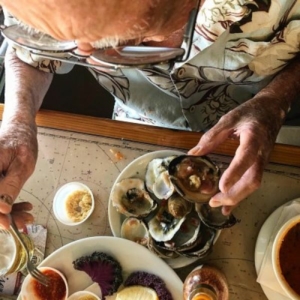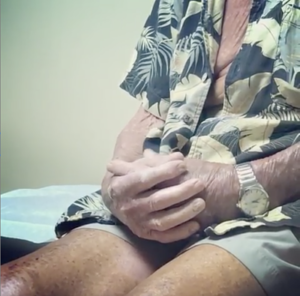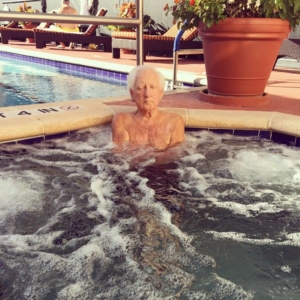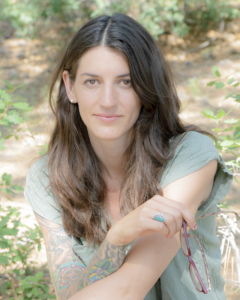Remember Raw Oysters?
My grandpa passed away, as a grandparent is wont to do. He was old and we, his family, expected as much. His death was his role as grandfather, that is, if time worked predictably and not cruelly. He would die while the rest of us went on.
I didn’t see him in his finally weeks when, as I was told, his body looked hollow and white and his glaucoma covered eyes stared off into a ganzfeld no one else could see. From afar I wondered what he saw. If he were able to speak I surely would have asked him, as I had many times in his later years, what it was like to stare into the great beyond. But he’d deftly avoided my previous attempts to raise death’s question, saying, “I’m not dead yet,” a redirection I understood as that indelible part of my grandfather that always clung to life.
A few hours before he died, I called my grandfather, but his energy was thin. I asked him what he was thinking about. He mumbled, “Sorbet.”
 “Remember raw oysters?”
“Remember raw oysters?”
“Mmmm…”
What about Chinese eggplant? The maraschino cherry at the bottom of your manhattan? Chocolate babka? How about homemade matzoh ball soup? Or, lemons picked fresh off the backyard tree? What about pistachio nuts still in their shells? Lobster?
A year earlier, when he was ninety-seven-years-old, I saw my grandfather order and eat his first lobster roll. He waited for it to arrive with no great fanfare, gazing out the window in between sips of dark red wine. When his entrée finally came he looked down with shock at the plate before him. “It’s a sandwich?” he said, his voice full of the skepticism one ought to have when they order the lobster and end up with a hoagie.
No sooner than he picked up the sandwich did its juice run down his hands and arms, dripping off his elbow and down onto the vinyl booth below. Unfazed he sunk his dentures into his first bite and was instantly reduced to closed mouth ohhhh’s and ahhhh’s that just couldn’t wait. “That’s good,” he said, mouth still full but already going in for another bite. They were the only words he’d let get between him and the rest of his meal.
 My fondest memories of my grandfather were all of his singular way of eating—of his instinctive physical desire for food—his appetite seemed to be the only thing capable of pausing his always insistent mind. (As a child I was convinced I could hear his mind churning only to one day discover it was the faint sound of his thumbs twiddling.) Often I wondered how food could let him forget himself and when I asked him, he said it was probably because they grew up together, in a three-story house on Brooklyn’s Avenue J, in the midst of the Great Depression. The circumstances of his upbringing didn’t allow him to think about what he wanted, to eat or to become, he had simply: to eat and to become. But in his final days, when my grandfather was mute and unable to eat, who he had become betrayed my idea of him, and so there was no grandiose goodbye.
My fondest memories of my grandfather were all of his singular way of eating—of his instinctive physical desire for food—his appetite seemed to be the only thing capable of pausing his always insistent mind. (As a child I was convinced I could hear his mind churning only to one day discover it was the faint sound of his thumbs twiddling.) Often I wondered how food could let him forget himself and when I asked him, he said it was probably because they grew up together, in a three-story house on Brooklyn’s Avenue J, in the midst of the Great Depression. The circumstances of his upbringing didn’t allow him to think about what he wanted, to eat or to become, he had simply: to eat and to become. But in his final days, when my grandfather was mute and unable to eat, who he had become betrayed my idea of him, and so there was no grandiose goodbye.
He died at two a.m., my mother sitting sleepless by his side. Days later she’d tell me about his last breath, a long and sudden inhale. Which was odd, because I’d always imagined death came on an exhale, as if it were the Grim Reaper’s courtesy to allow for a person’s complicity in their own ending—the final will of letting go. I thought my grandfather must have wanted to die this way, to suck in as much air as he could, either in preparation for his final leap, or maybe just one last taste of life, to be savored to the last.
* * *
By the time I woke up the next morning, my family’s social media feeds had already filled with memories: of his beloved lemon tree, his motorized scooter that took him across town, his impossibly sharp intelligence, @isaiahhaas tagged in every one. @isaiahhaas, who, according to facebook, was still alive. But neither used to nor ready to regard my grandfather as a memory, I read the posts as if to consume them into nonexistence. Having done so, I was left at a distance to the stories and the man they recounted. The posts carried no mouth feel, no flavor, they were bittersweet without an experience of what that actually tasted like. The intention behind them was good, and the process surely cathartic, but when I was done reading the far-away words I felt intensely unsatisfied, still clamoring for a substance to process and digest.
For the first time, I found myself fearful of the threat technology posed to the past: my grandfather’s extended family, once stacked in a three-story house, was now spread out all over the world and, no longer centralized, its identity seemed to hinge on what amounted to a listserv. As heavy as the loss of my grandfather’s individual life was the loss his absence revealed—the loss inherent in our diaspora.
My grandfather represented an Archimedean point upon which my family and I had rested ours ideas of ourselves, but even then his single point was more accurately two. Ever since he was a boy, my grandfather went by two names, each holstered and at the ready: Sheldon and Isaiah. Sheldon was what he went by in school, on applications, and during his career as an engineer. Isaiah was the name he used with family, and at synagogue. In an ironic softening of boundaries, my grandma finally gave in and started calling him Shelly in the mid 1990’s, just a decade or so before she passed. But by that point, my grandfather was retired and, having had enough of his borrowed name, had returned to his given Isaiah. For the most part we obliged him, except for six-year-old me who once saw him open a can of spinach and has called him Popeye ever since.
Maybe my grandparents intended this cultural vagary. Having survived pogroms and immigration, poverty and the odds so stacked against them, their victory was partly won in their ability to forget—and to be forgotten. In America they would still be Jews, but in America they could also be, simply, white. His blank slate was my inheritance but I’ve never known quite what to do with it. What story is left in the void of story?
Like a lot of American Jews, our family has become less and less religious over the years, to the point that I hardly remember the holidays or the reasons for their celebration. I know that on Rosh Hashanah I am to fast and say L’Shana Tovah, but I rarely do. I know that on Purim I am supposed to dress up and tell the story of how the Jews vanquished their oppressors who wore funny shaped hats, but I don’t. And to be honest, it’s been so long since I’ve gone to a Passover Seder that I’ve forgotten the taste of parsley dipped in saltwater, the taste of my ancestors’ tears and the flavor that’s supposed to be enough to understand why they cried.
It wasn’t until after my grandfather died that I realized his love for food wasn’t accidental or optional—food was our family’s act of remembering and forgetting. I thought of the memorial service I assumed we’d have, looking forward to the family and the feast as a way of moving on and so of living. But then I got an email—no subject line—letting me know there would be no funeral.
* * *
I’d been working on my grandfather’s eulogy for a few years before he died—tape recording conversations, scribbling down adorable things he’d done, writing heartfelt passages about the man I didn’t know how to live without. As a writer, I thought I might beat death by capturing his presence on the page, but with no funeral, there would be no eulogy. Still, I needed to grieve so I took to eating instead. Mouthful after mouthful, I ate all the things I could remember him eating and learned that grief could turn any flavor bittersweet. I wasn’t as voracious as he’d been, and with every half-eaten plate I felt further from him, not closer as I’d thought I would. And so it was that with a full stomach and a fridge full of leftovers that wouldn’t keep, I realized the thing I cherished most about my grandfather was his appetite for more.
In the last twenty years of his life my grandfather had become an athlete of sorts, taking daily trips to the pool where he would wrap a foam noodle around his waist and take 10,000 underwater steps, his mathematical mind counting each and every one. His steady pedaling was as pleasurable for me to watch as I imagined it was for him to do—he would lean back and let the water support his weight and then he’d move with an ease inaccessible to his aging body on land. In the water, counting steps with eyes shut and sun on his face, his ninety-eight years were reduced to thirty, the buoyancy of the water mimicking the effects of the fountain of youth. And when his goal was met he would ascend from the depths to rejoin the terrestrial world, full again with ninety-eight years worth of aches and pains, but also full of hunger.
My grandfather had many opinions about the state of the pool—of its temperature and chlorine level, of its rules and regulations. He joined committees and boards in order to gain a voice for his concerns and somehow he always got his way. His victories came with the cost of becoming a rather unpopular resident of the retirement community, but my grandfather was especially hard of hearing, so I doubt he even noticed. As a man and a Jew who didn’t believe in the afterlife, I think the pool was my grandfather’s version of heaven, a place where he could quite literally walk on water. The pool, at least, had the potential to be perfect, to be his, and that was worth fighting for, worth being outcast for.
 I was with him on his last day at the pool, just six months before he died. Having spent two decades fighting for the rules he’d gotten to the point where, despite himself, he was beginning to betray them. One day, after his workout, he went to the hot tub and, lulled by the pulsing jets, dozed off, just below the sign that read: “No sleeping.” A nurse who was passing by, and who could only have been named Nurse Ratchet, pulled me aside to berate his rebellion and tell me his swimming days were over. I went to the hot tub and crawled in beside him, waking him with my arm around his shoulder. “Wake up, Pops,” I said. “Time for lunch,” and while we ate lox rolled up with capers I told him what the nurse had said and, with no fight left in him, he said nothing at all. Hours later he said, “I don’t think there’s anything left worth living for.” What is life without an appetite for it?
I was with him on his last day at the pool, just six months before he died. Having spent two decades fighting for the rules he’d gotten to the point where, despite himself, he was beginning to betray them. One day, after his workout, he went to the hot tub and, lulled by the pulsing jets, dozed off, just below the sign that read: “No sleeping.” A nurse who was passing by, and who could only have been named Nurse Ratchet, pulled me aside to berate his rebellion and tell me his swimming days were over. I went to the hot tub and crawled in beside him, waking him with my arm around his shoulder. “Wake up, Pops,” I said. “Time for lunch,” and while we ate lox rolled up with capers I told him what the nurse had said and, with no fight left in him, he said nothing at all. Hours later he said, “I don’t think there’s anything left worth living for.” What is life without an appetite for it?
A few weeks ago, I had a dream about my grandfather dying on the side of a pool, this time as a young man, no more than thirty-five, the same age as me, and although I’d never seen him like that before, I knew him—his broad chin and thick nose and big brown eyes—just like mine. He was so familiar, so unmistakably himself, and with tears running down his face and death imminent, no words came. I just held him and let him cry and looked into his eyes, aware only of how much they looked like mine. “Remember raw oysters?” I said, as he died in my arms. Even then there was no time, no reason, for goodbye. Just enough time for us to look each other in the eyes, for my tears to fall into his. For me to wake with the taste of tears at the corners of my mouth and think of how much it tasted like parsley dipped in saltwater.
Sarah is a writer living in the mountains of New Mexico. Her work has appeared or in Longreads (forthcoming), The Rumpus, LARB, Paste, Boulder Weekly, Westword, and The Mountain Ear. She is an MFA candidate in nonfiction at Antioch University, where she serves as Blog Editor and Content Manager for Lunch Ticket. Read more at sarahrosehaas.com





